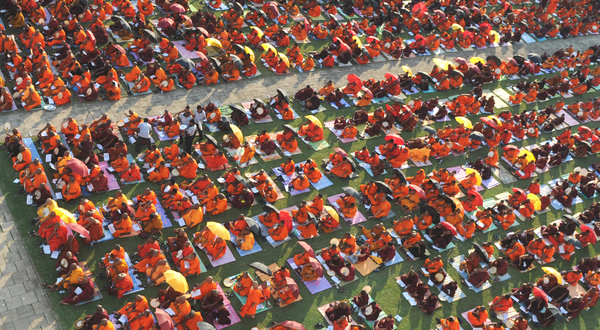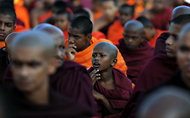Ilankai Tamil Sangam28th Year on the Web Association of Tamils of Sri Lanka in the USA |
|||||
 Home Home Archives Archives |
U.N. Panel Seeks Vote on Carnage in Sri Lankaby Nick Cumming-Bruce, The New York Times, March 19, 2012
Hundreds of Buddhist monks demonstrated on Monday in Colombo against a United Nations resolution calling on Sri Lanka to probe wartime human rights abuses. GENEVA — Even as it faces new demands to act to protect civilians in Syria, the United Nations Human Rights Council will vote this week on an American-led initiative calling on Sri Lanka to account for the carnage that ended its civil war three years ago, a move that has become the focus of a tense diplomatic tussle in Geneva and anger in Sri Lanka.
The target of Sri Lankan official ire is a resolution put forward by the United States at the rights body in Geneva calling on the government “to address serious allegations of violations of international law by initiating credible and independent investigations and prosecutions of those responsible for such violations.” Those allegations were detailed last year by a United Nations panel that said the Sri Lankan Army, conducting what the government called a “humanitarian rescue operation,” had caused the deaths of as many as 40,000 civilians in the final stages of the war against the Tamil Tigers. The report also found credible evidence that both sides in the conflict had committed war crimes and crimes against humanity. The proposed American resolution, described by Eileen Donahoe, Washington’s ambassador to the Geneva rights body, as “exceedingly cooperative and collaborative in spirit,” avoids specific reference to these charges. Instead, it calls on the government to implement “constructive recommendations” made by the “Lessons Learned and Reconciliation Commission,” which it had set up to examine events. It also calls on the United Nations human rights commissioner to report back on progress in a year. The resolution reflects concern that Sri Lanka has made little serious effort to follow up on its own commission’s recommendations and backs the idea that a credible accounting of events in countries emerging from conflict is crucial to avoid sowing the seeds of future violence, Ms. Donahoe said in an interview. It followed months of bilateral contacts as part of a “very genuine attempt to encourage the Sri Lankan government in the right direction,” she said. Yet diplomats say that President Mahinda Rajapaksa of Sri Lanka has personally contacted leaders of governments in Asia, Africa and Latin America to rally opposition to the resolution. Foreign Minister Gamini Peiris, on a trip to Africa, condemned it as “strikingly divisive and polarizing” and as “an initiative against Sri Lanka.” In Geneva, Sri Lanka accredited more than 70 delegates for the Human Rights Council session and began a vigorous lobbying campaign to try to stall the initiative. Sri Lanka already has an action plan for promoting human rights, Mahinda Samarasinghe, a government minister and special envoy on human rights, told the council at the end of February, outlining measures it has taken to bring economic and social rehabilitation to areas affected by conflict. Sri Lanka needs time to make progress on these initiatives, he said, not pressure from countries falling prey to the propaganda and coercive tactics of “defeated terrorists” who seek to pursue punitive action through a “redundant resolution” at the human rights council. Within Sri Lanka, human rights groups report that protests in recent weeks have attacked the resolution as Western meddling, and the pro-government news media have aggressively denounced civil society activists backing it as supporters of the defeated Tamil Tiger rebels. Such tactics have also spilled over to Geneva, where Sri Lankan nongovernmental organizations have complained of intimidation by Sri Lankan delegates photographing their members even inside the human rights council chambers, prompting an extraordinary rebuke by its Uruguayan president, Laura Dupuy Lasserre. The outcome of the debate starting Thursday, however, is considered as much a test of the council as of the two sides in Sri Lanka. In 2009, soon after its civil war ended, Sri Lanka stunned its critics, appealing to the loyalty of its neighbors and other developing countries to achieve a council resolution largely commending its approach to reconciliation. Three years later, diplomats and council observers say the challenge has grown more complex. As the Arab Spring unfolded over the past year, support for resolutions against abusive regimes and the impunity of their rulers has grown, analysts say. Human rights groups have seized the platform provided by the discussion of Sri Lanka to air allegations of continuing human rights abuses in the country that are not confined to the Tamil population but are aimed at any critics of the government. An Amnesty International report released at the United Nations in Geneva last week recorded 32 abductions or disappearances since October. The lack of accountability for what happened at the end of the war “sent a very clear signal to security forces throughout Sri Lanka that they can get away with abductions, torture, even murder without any consequences,” said Sam Zarifi, the group’s Asia-Pacific director. Moreover, the regional solidarity once so dominant in council proceedings has frayed over the past year or so, diplomats and council observers say. The rationale for the American resolution on Sri Lanka, Ms. Donahoe said, “is resonating across most regions.” The exception is Asia, Ms. Donahoe acknowledged, but even there the ground may be shifting in ways that do not bode well for the Rajapaksa government. Pakistan and Thailand have already voiced their opposition to the resolution, but domestic political pressures appear to have pushed India, Sri Lanka’s close neighbor and ally, the other way. Prime Minister Manmohan Singh told Parliament on Monday that India was inclined to support the resolution.
| ||||
 Ishara S.Kodikara/Agence France-Presse — Getty Images
Ishara S.Kodikara/Agence France-Presse — Getty Images 